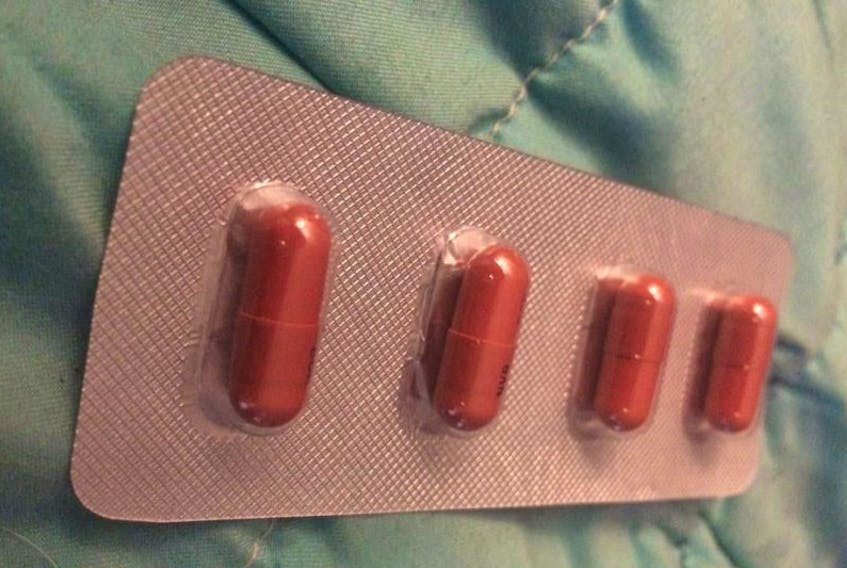Oral cancer medications are not covered by Nova Scotia’s provincial health plan, even though at times this is the only cancer treatment option available. This means for a segment of cancer patients without private insurance it might be a credit card, not a health card, they require.
Cancer care advocates have been pushing for years to have the province cover oral cancer medications.
At the time the Nova Scotia election was called the issue remained outstanding.
Lesser has taken to his personal Facebook page to draw attention to this issue during this election campaign.

In September 2014, Lesser’s daughter Julia was diagnosed with chronic myeloid leukemia, or CML. Lesser says with this type of cancer chromosomes in the body merge together to form cancerous ones that start multiplying, crowding out the healthy ones in the blood and bone marrow.
As a result of treatment, his daughter is doing extremely well and has just trace amounts of the cancerous cells.
“She does not want people asking her how she feels, because she feels good everyday,” her dad says. “It’s not that type of cancer.”
He says she’s doing well because of the oral medication – Tasigna – she takes. CML is not treated with chemo or radiation.
And therein lies the problem, Lesser says, not just for his daughter, but for others as well. The drug his daughter uses as treatment costs $48,000 a year.
She was 22 when she was diagnosed. The family's health insurance coverage had stopped covering her when she was 21. New health coverage would consider this a preexisting condition so there wouldn’t be coverage, he says.
Through its provincial health plan, Nova Scotia covers cancer drugs and treatments that are administered intravenously in a hospital setting. But the same coverage doesn't exist for oral medications.
The Nova Scotia Pharmacare program does provide financial help, but assistance is based on income levels. And at certain income thresholds, deductibles and co-payments are a requirement.

Lesser’s daughter was able to go the Pharmacare route for coverage assistance because she’s a nursing student with a part-time job, putting her in a low-income category. (As an aside, Lesser was surprised at how invasive it is to get approval, given the amount of personal information that has to be handed over. He likens it to “ basically submitting everything but your DNA to everybody and their dog.”) But what happens, he says, when his daughter, and others like her, no longer qualify for full Pharmacare coverage due to their income?
The Canadian Cancer Survivor Network says Canada’s western provinces, through their provincial public health plans, treat hospital-administered cancer drugs and take-home drugs equally. CanCertainty, a coalition of more than 30 cancer groups, has been lobbying the Nova Scotia government to do the same.
“Nova Scotians want a cancer system that puts patients first, that allows people to focus on their health, and puts the burden of funding, access and administration into the background – which could be achieved with a modest investment,” Deb Maskens, a kidney cancer patient and co-founder of CanCertainty, said in an April 26 media release. The coalition estimates a $2 million annual investment by the province could help close the gap for those with limited, or no, private insurance who require this type of treatment.
When Derek Lesser’s daughter enters the workforce with a higher-paying job, she’ll have to start doing a co-pay through Pharmacare to cover her treatment drug, Lesser says, which could still cost around $20,000 a year.

Or not.
The family has been told when she becomes a nurse her nursing health coverage should cover the drug. But Lesser says there is still the uncertainty of whether it will be considered pre-existing. And what if his daughter chooses not to be a nurse?
“People shouldn't be losing sleep wondering what is going to happen,” says Lesser, who has had many sleepless nights.
For the past two-and-a-half years he had been raising the issue with the governing Liberal party. Yarmouth MLA Zach Churchill, he says, was great, advocating on their behalf. But Churchill wasn’t the decision maker. Lesser had meetings with Health Minister Leo Glavine and Finance Minister Diana Whalen but those meetings went nowhere, he says. Emails he sent to the premier and other MLAs went unanswered.
In the Nova Scotia Legislature on Oct. 26, 2016, Chris d’Entremont, the Argyle-Barrington PC MLA at the time, had asked the health minister about whether the province would commit to oral at-home medications for cancer patients. Glavine said the province was funding oral drugs at a cost of $10 million with 87 per cent of Nova Scotians having their oral medication funded by one of the provincial programs. He also said they were currently looking to see how they could improve the cost of the oral cancer drugs to expedite the process from diagnosis to treatment.
CanCertainty calls the difference between in-hospital and out-of-hospital administered cancer treatment a two-tiered treatment issue. Traditionally, says CanCertainty, all cancer treatments were administered to patients by an IV in the hospital. But over the past 10 years an increasing number of effective cancer treatments can be taken at home by pill or injection. Because take-home cancer medications are a fundamental part of today’s cancer treatments, the coalition says all cancer treatments should be recognized equally within the health care system.
Derek Lesser really wanted to see firm action from the last government on the issue. He’s frustrated he didn’t. He hopes the government elected May 30 will act on the issue, whichever party it is.
“Our goal is to just try and get coverage so other people don’t have to go through this. It’s happening everyday. Someone gets a diagnosis and they’re told we don’t know how it’s going to be covered,” Lesser says.
“I’ve been a Liberal my whole life. This is beyond politics for me,” he says. “It wouldn’t matter what government said no, I’d be fighting it.”
• WHERE DO THE PARTIES RUNNING IN THE 2017 PROVINCIAL ELECTION STAND ON THIS ISSUE? We'll be exploring that aspect in a future story.









